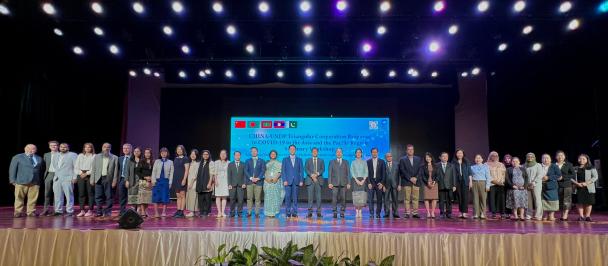The coronavirus disease 2019 (COVID-19) has shocked the world with the agility and speed of its spread.
Since it emerged in humans in China late last year, it has raced around the globe, killing thousands of people, sickening hundreds of thousands more, and prompting travel bans and lockdowns. International gatherings and sports events have been cancelled, more than 290 million children are not in school, and markets are reeling. In some countries, tourism, a vital occupation for many, has virtually stopped and we are seeing famous cultural landmarks as never before—almost empty.
It’s estimated that the epidemic could cost the world economy US$2 trillion.
World Health Organization (WHO) Director-General Tedros Adhanom Ghebreyesus describes COVID-19 as: "The defining global health crisis of our time".
Help for the most vulnerable
Pandemics can be reversed, but only with the highest level of political commitment.
WHO has asked the international community for US$675 million to fight the virus.
The United Nations has dedicated US$15 million to fund essential activities such as monitoring the spread of the virus, investigating cases and supporting national laboratories.
A United Nations Crisis Management Team has been established with WHO in the lead. UNDP is playing a key role in the wider UN response.
Building on our experience with the COVID-19 response in the Asia Pacific, along with our worldwide work on Ebola, Zika, H1N1, SARS, and MERS, a UNDP Crisis Management Team has been established in Bangkok. Similar teams will follow in other regions, and our Global Policy Network will work with countries to ensure they have the necessary equipment to prevent and respond to COVID-19 and to ensure that their medical supply chains are strong.
Keep calm and wash your hands
Viruses spread fear as well as illness. Medical and public health experts have repeatedly emphasized that COVID-19 is cause for concern and preparation, not panic. About 80 percent of those who get the virus will have only mild symptoms, or none at all.
To distribute accurate, non-sensational information, UNDP has teamed up with AMV, one the world’s largest advertising agencies, and British actor, writer, and comedian Stephen Fry for the Tweet Zero campaign. It aims to highlight the simple actions that can keep you safe, such as washing your hands frequently, staying home when sick, and not touching your face.
The aim of the campaign is simple: We want the tweet to overtake the growth of the virus, so that all over the world, people can feel confident that they are behaving in a way that keeps themselves, and their loved ones, safe.
Economic consequences
The epidemic, if not managed correctly, could have far-reaching economic consequences, which would widen existing inequalities and further hobble the world’s efforts to achieve the Sustainable Development Goals (SDGs).
The United Nations Conference on Trade and Development has said the virus could cause recession in some countries and depress annual growth by 2.5 percent. The World Bank has announced an initial economic package of US$12 billion to countries coping with the health and economic impacts of the outbreak.
UNDP will assess the social and economic impact of the virus, raise resources, build partnerships and communicate about the risks and what can be done to lessen them. Good health is essential to sustainable development and as part of its commitment to SDG 3—good health and wellbeing—it will step up its efforts to help countries to achieve universal health coverage.
We are fully committed to using our resources to the utmost to support the most-affected countries, where health systems are weakest and people are at their most vulnerable.

 Locations
Locations




